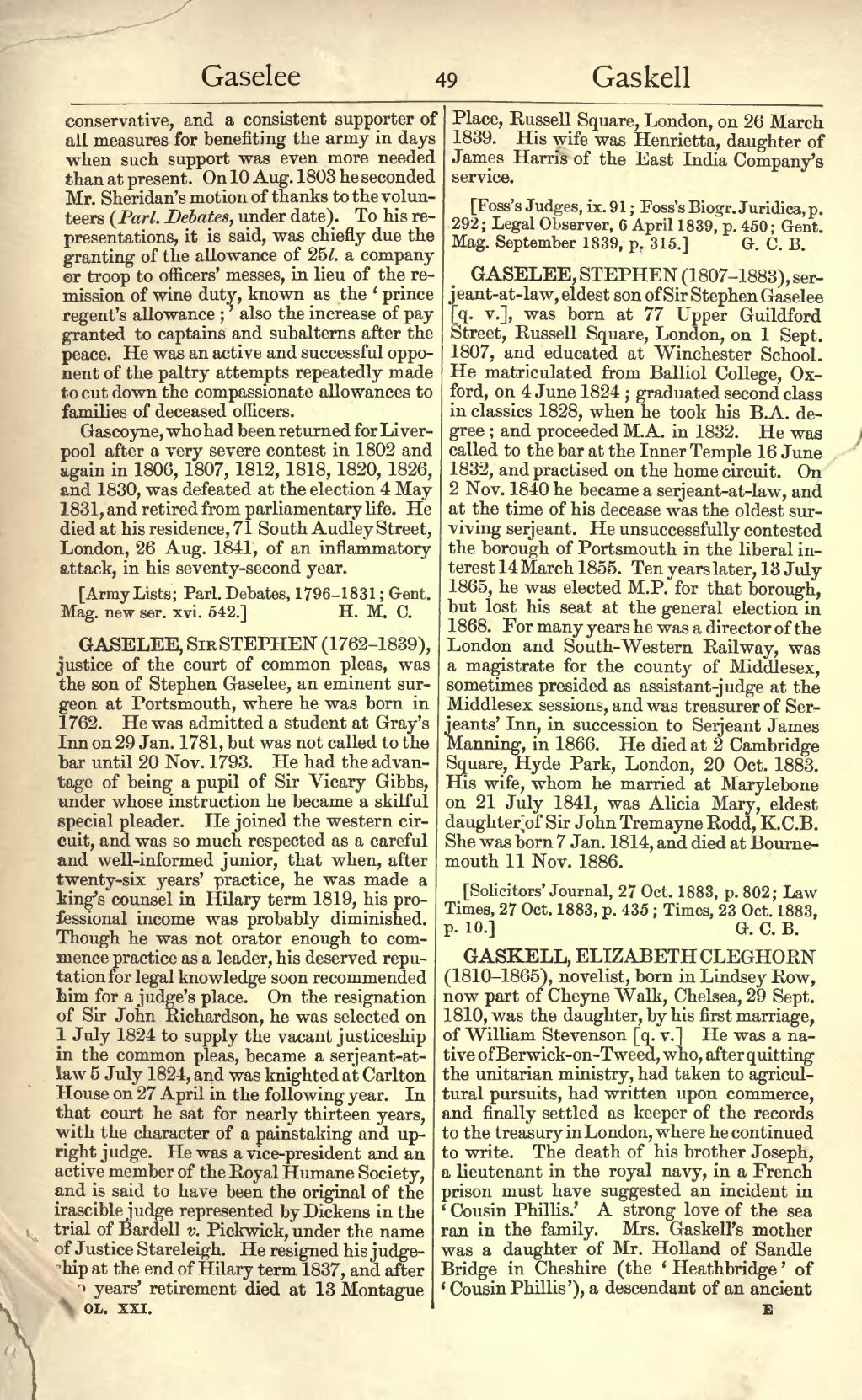conservative, and a consistent supporter of all measures for benefiting the army in days when such support was even more needed than at present. On 10 Aug. 1803 he seconded Mr. Sheridan's motion of thanks to the volunteers (Parl. Debates, under date). To his representations, it is said, was chiefly due the granting of the allowance of 25l. a company or troop to officers' messes, in lieu of the remission of wine duty, known as the ‘prince regent's allowance;’ also the increase of pay granted to captains and subalterns after the peace. He was an active and successful opponent of the paltry attempts repeatedly made to cut down the compassionate allowances to families of deceased officers.
Gascoyne, who had been returned for Liverpool after a very severe contest in 1802 and again in 1806, 1807, 1812, 1818, 1820, 1826, and 1830, was defeated at the election 4 May 1831, and retired from parliamentary life. He died at his residence, 71 South Audley Street, London, 26 Aug. 1841, of an inflammatory attack, in his seventy-second year.
[Army Lists; Parl. Debates, 1796–1831; Gent. Mag. new ser. xvi. 542.]
GASELEE, Sir STEPHEN (1762–1839), justice of the court of common pleas, was the son of Stephen Gaselee, an eminent surgeon at Portsmouth, where he was born in 1762. He was admitted a student at Gray's Inn on 29 Jan. 1781, but was not called to the bar until 20 Nov. 1793. He had the advantage of being a pupil of Sir Vicary Gibbs, under whose instruction he became a skilful special pleader. He joined the western circuit, and was so much respected as a careful and well-informed junior, that when, after twenty-six years' practice, he was made a king's counsel in Hilary term 1819, his professional income was probably diminished. Though he was not orator enough to commence practice as a leader, his deserved reputation for legal knowledge soon recommended him for a judge's place. On the resignation of Sir John Richardson, he was selected on 1 July 1824 to supply the vacant justiceship in the common pleas, became a serjeant-at-law 5 July 1824, and was knighted at Carlton House on 27 April in the following year. In that court he sat for nearly thirteen years, with the character of a painstaking and upright judge. He was a vice-president and an active member of the Royal Humane Society, and is said to have been the original of the irascible judge represented by Dickens in the trial of Bardell v. Pickwick, under the name of Justice Stareleigh. He resigned his judgeship at the end of Hilary term 1837, and after two years' retirement died at 13 Montague Place, Russell Square, London, on 26 March 1839. His wife was Henrietta, daughter of James Harris of the East India Company's service.
[Foss's Judges, ix. 91; Foss's Biogr. Juridica, p. 292; Legal Observer, 6 April 1839, p. 450; Gent. Mag. September 1839, p. 315.]
GASELEE, STEPHEN (1807–1883), serjeant-at-law, eldest son of Sir Stephen Gaselee [q. v.], was born at 77 Upper Guildford Street, Russell Square, London, on 1 Sept. 1807, and educated at Winchester School. He matriculated from Balliol College, Oxford, on 4 June 1824; graduated second class in classics 1828, when he took his B.A. degree; and proceeded M.A. in 1832. He was called to the bar at the Inner Temple 16 June 1832, and practised on the home circuit. On 2 Nov. 1840 he became a serjeant-at-law, and at the time of his decease was the oldest surviving serjeant. He unsuccessfully contested the borough of Portsmouth in the liberal interest 14 March 1855. Ten years later, 13 July 1865, he was elected M.P. for that borough, but lost his seat at the general election in 1868. For many years he was a director of the London and South-Western Railway, was a magistrate for the county of Middlesex, sometimes presided as assistant-judge at the Middlesex sessions, and was treasurer of Serjeants' Inn, in succession to Serjeant James Manning, in 1866. He died at 2 Cambridge Square, Hyde Park, London, 20 Oct. 1883. His wife, whom he married at Marylebone on 21 July 1841, was Alicia Mary, eldest daughter of Sir John Tremayne Rodd, K.C.B. She was born 7 Jan. 1814, and died at Bournemouth 11 Nov. 1886.
[Solicitors' Journal, 27 Oct. 1883, p. 802; Law Times, 27 Oct. 1883, p. 435; Times, 23 Oct. 1883, p. 10.]
GASKELL, ELIZABETH CLEGHORN (1810–1865), novelist, born in Lindsey Row, now part of Cheyne Walk, Chelsea, 29 Sept. 1810, was the daughter, by his first marriage, of William Stevenson [q. v.] He was a native of Berwick-on-Tweed, who, after quitting the unitarian ministry, had taken to agricultural pursuits, had written upon commerce, and finally settled as keeper of the records to the treasury in London, where he continued to write. The death of his brother Joseph, a lieutenant in the royal navy, in a French prison must have suggested an incident in ‘Cousin Phillis.’ A strong love of the sea ran in the family. Mrs. Gaskell's mother was a daughter of Mr. Holland of Sandle Bridge in Cheshire (the ‘Heathbridge’ of ‘Cousin Phillis’), a descendant of an ancient
